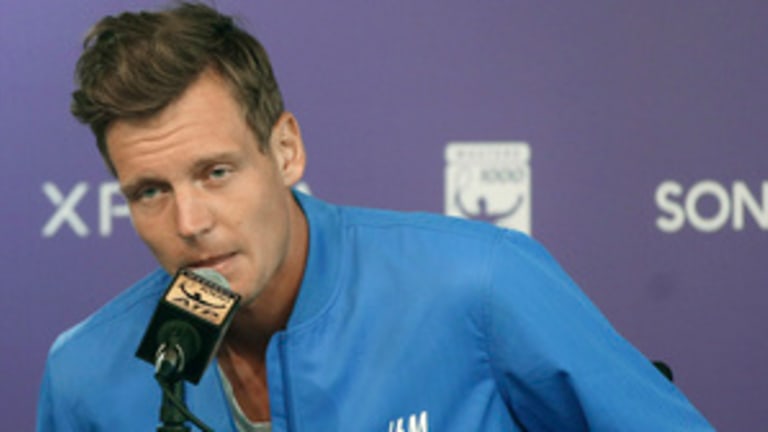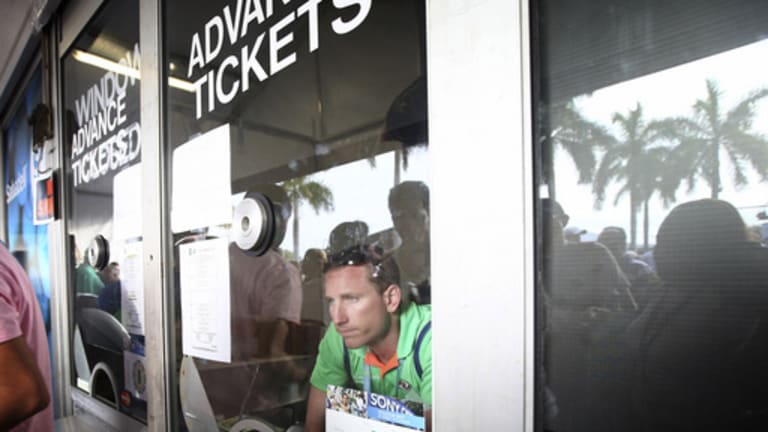Berdych didn’t even try to hit a ball today. “That's the worst basically that a tennis player can get, you know. Without any energy or anything, cannot do anything.”
Even Nadal, who got an undoubtedly welcome day off and free pass into the final, had nothing but sympathy. He said, “It's very unlucky, very unusual. . . Sorry for Kei, sorry for Tomas, and sorry for the tournament—especially sorry for the fans.”
Those fans were already crawling in cars across the Rickenbacker Causeway or wending their way into Crandon Park under the soft pink and baby-blue skies over Key Biscayne when the news broke. Ironically, the winds of Thursday and last night had expended themselves by midday, and it seemed a lovely evening was in store when the announcement about Berdych’s condition was made. A good portion of the press corps was partaking of the complimentary happy hour (a tournament tradition) when they got the news, and you never saw plastic glasses of wine and plates loaded with tortilla chips and pico de gallo abandoned so swiftly.
The capacity of the stadium is 13,800, and both sessions were sold out. It’s conceivable that as many as 27,000 fans will apply for free tickets to a comparable session next year. That includes the ones who apparently figured that once they had fought the traffic to get here and had paid for parking, they might as well stay.
Thus, the stadium was half-full for the doubles match that was supposed to have followed the clash between Nadal and Berdych. It was probably as large a crowd as doubles semifinalists Raquel Kops-Jones and Abigail Spears and the team of Ekaterina Makarova and Elena Vesnina had ever played to.
It’s uncertain how many tickets the tournament will have to make good on for next year. I have a funny feeling that it won’t be nearly as many as possible. But that’s still a big blow to the tournament, because it translates to a total of about four “lost” sessions of play when it comes to concessions and merchandise, and (theoretically) two full sessions of tickets.
“Me and my team, you know, it's hard to get through a day like this,” said tournament director Adam Barrett. “You do what you can, and you hope for the best.”
He went on: “We look forward to the good news, which is we do have the number one and number two players playing two days in a row (a reference to the WTA and ATP finals). I don't know that that's ever happened. I'm sure it hasn't happened a lot at any tournament, so we have good match-ups lined up for the weekend. We will try to take care of all of our fans the best that we can. It's not an optimal situation.”
Indeed it isn’t. And that raises an interesting question. Although glut is more common in tennis scheduling than scarcity, is it wise to offer fans only one singles match per session until the final? Note that at the Grand Slam events, the alternate days regimen virtually guarantees at least two singles matches per day. Of course, in this case even the more familiar (and fair) scheduling would not have averted a busted day.
“We analyze anything, both good or bad, to see if we can make improvements,” Barrett said when he was asked if the tournament would re-think its scheduling. “So if there is a better format out there, a better schedule out there that lowers the risk, we will look at it.”
Unfortunately, at a time when split sessions translates to double revenues, prime-time television has a much broader canvas, and so relatively cramped schedules—a combined 10-day event jams in almost as much action as a two-week Grand Slam—leads all constituents to experiment with creative scheduling. It’s unlikely that split sessions will be cut back, and that’s exactly what it would take to play two semifinals on the same day (or night).
Miami may be particularly vulnerable to the kind of disaster that occurred today because it comes at the end of a long swing that now packs the calendar pretty tightly starting almost immediately after the Australian Open. And many who play in the combined event at Indian Wells, immediately preceding this one, have had it up to the gills with tennis by the time Miami winds down.
Case in point: After losing his quarterfinal to Berdych yesterday, Alexandr Dolgopolov—who’s done very well these past two months—spoke frankly about his mental state.
“The whole tournament here, my concentration was going up and down, up and down. . .Today I was again really tired and disconcentrated. I had my chances, but I gave away too many points. So it's been a tournament like that. I knew it was going to be tough because I played too much tournaments straight. “
He elaborated: “I don't have too much emotions now. I just want to get away from the ball and the court and the tournaments for some time. . . walking out for the match I wanted to sleep and I was completely somewhere out there.”
Okay, so the finalists have played a fair amount of tennis this year as well. And the seedings held up much better in Miami than they did in the preceding tournament at Indian Wells. Perhaps Dolgopolov will be lucky enough to have this “disconcentration” problem going forward, and find a way to develop the extra mental and physical stamina needed to handle the work load—and the rewards as well as stresses that come with it.
You can’t really blame today’s disaster on the place the tournament occupies on the calendar, but perhaps it strikes a warning note for the future.

